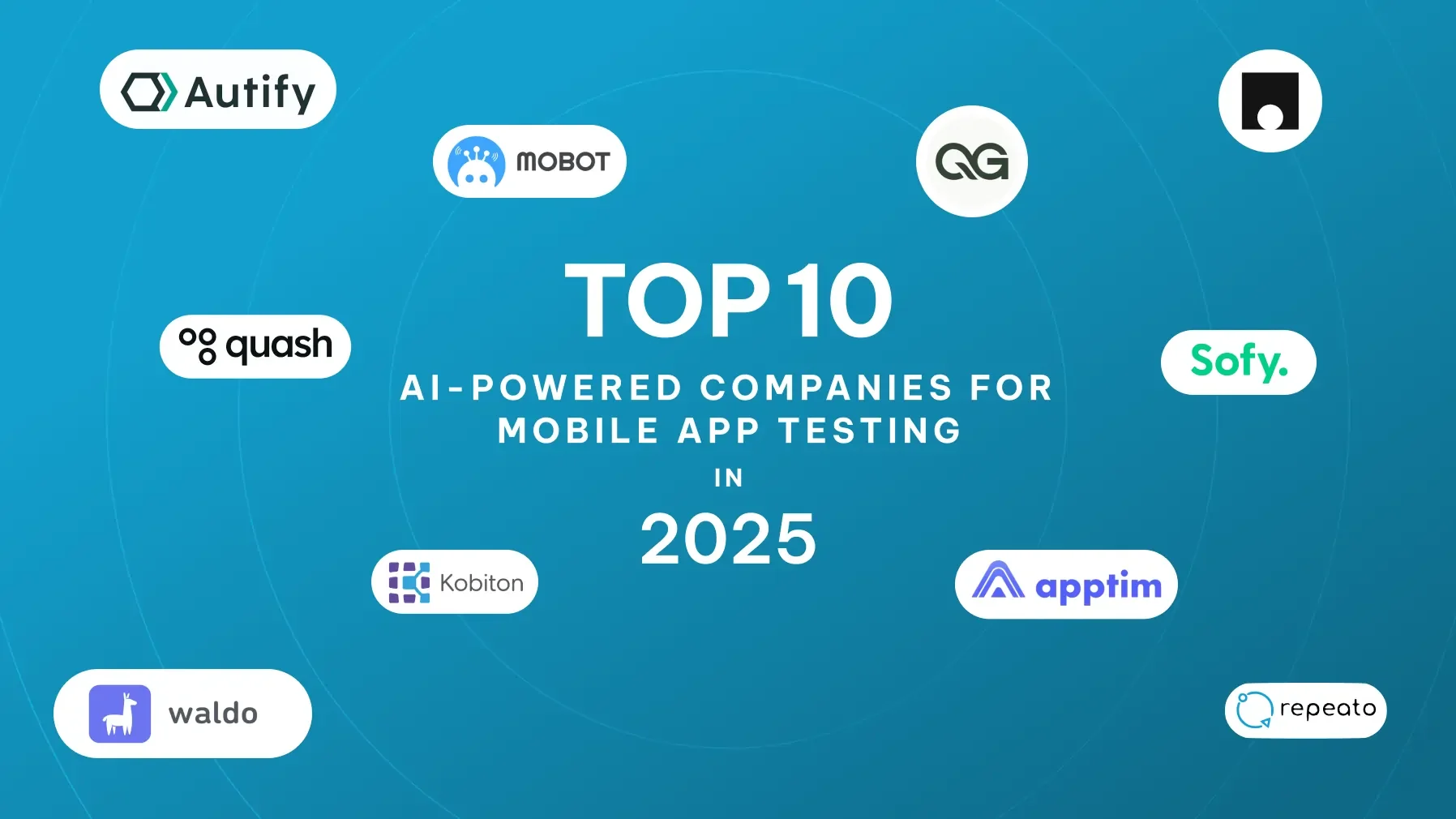AI in Mobile Testing: Top 10 of 2025
Introduction
As mobile apps continue to lead user engagement in 2025, testing them efficiently has become a true competitive advantage. The evolution of AI has unlocked entirely new possibilities from robotic testing rigs that mimic real-world gestures to prompt-based test agents that generate and execute test flows automatically. In an increasingly mobile-first world, relying on generic, cross-platform tools is no longer enough.
This blog highlights ten companies that focus exclusively on mobile testing. Each one is purpose-built to handle the unique challenges of mobile development from fragmented devices and OS versions to real-user conditions. Whether you're fine-tuning an e-commerce app, scaling a fintech platform, or releasing updates weekly, these standout platforms bring AI-driven capabilities to help you streamline releases, reduce bugs, and deliver a stable, high-quality app experience.
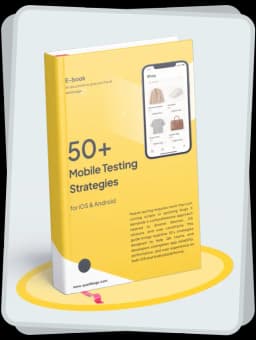
Get the Mobile Testing Playbook Used by 800+ QA Teams
Discover 50+ battle-tested strategies to catch critical bugs before production and ship 5-star apps faster.
1. Quash
Founded in 2023, Quash is an AI-powered quality assurance platform purpose-built for mobile app testing. It eliminates the need for manual scripting by automating the entire QA lifecycle, from test case generation to bug reporting. Quash brings intelligence and context-awareness into mobile testing, helping teams move faster while maintaining high confidence in app quality. The platform integrates seamlessly into modern development workflows, making it especially useful for agile and continuous delivery teams.
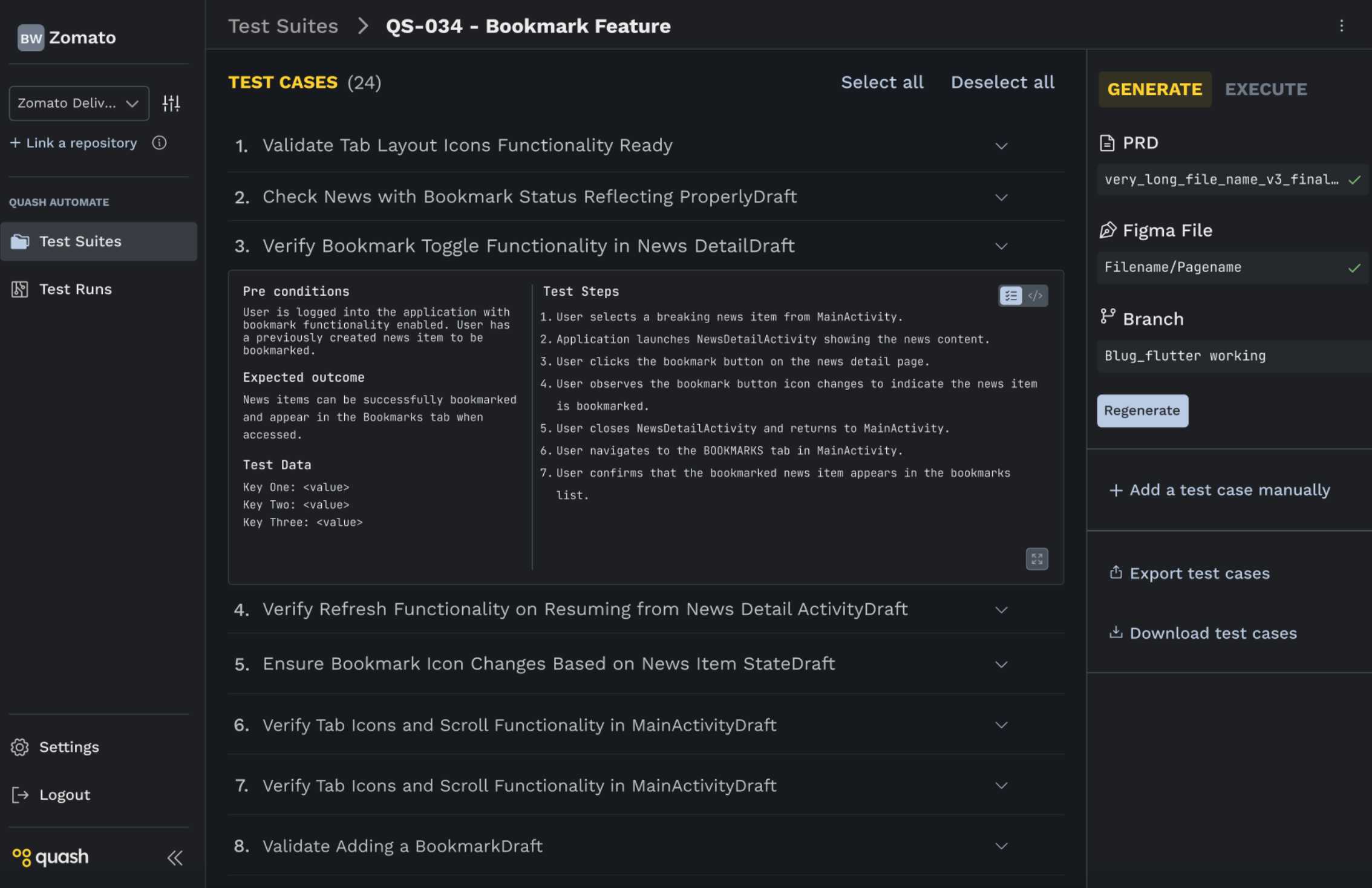
Key Capabilities
AI-native test generation: Quash automatically converts product assets like PRDs, Figma designs, and app store listings into structured, executable test cases. This allows teams to get immediate test coverage from the very beginning without writing a single line of code.
Context-aware test execution: Quash understands the intent behind each user flow. It analyzes semantic cues in the UI and verifies behavior based on expected outcomes, which helps reduce noise in test results and ensures only meaningful bugs are flagged.
Flexible export into your stack: Teams can easily sync test cases and bug reports to tools they already use, such as Jira, TestRail, or custom CI/CD pipelines. This minimizes disruption and ensures that QA stays in step with the rest of the development cycle.
Support for real devices, simulators, and app stores: Whether testing locally or in the cloud, Quash supports a wide range of devices and environments. It also enhances test scenarios by parsing real-world user feedback from app store listings and reviews.
Redesigned bug reporting: Every issue reported by Quash includes actionable details like annotated screenshots, crash logs, and direct links to the test step where the failure occurred, eliminating the back-and-forth between QA and developers.
Strengths
Mobile-focused design ensures the platform stays deeply optimized for mobile apps without unnecessary features for web testing
Built-in integrations with tools like Jira, GitHub, Bitrise, Notion, and Slack allow for smooth collaboration across teams.
Offers on-premises deployment for organizations with strict compliance needs, including SOC 2, ISO, and GDPR requirements.
Slack-based support model ensures fast and human responses with guaranteed SLA-driven turnaround times
Limitations
Quash is still a small team with fewer than 30 employees, so major feature requests may take longer to implement compared to more mature platforms
2. Kobiton
Kobiton is a mobile-first testing platform developed as a spinout from KMS Technology. It provides a robust real-device cloud that supports both scriptless automation and popular testing frameworks like Appium and Espresso. Trusted by enterprise clients such as Nike and AT&T, Kobiton is built to handle high-scale mobile testing needs across both Android and iOS ecosystems.
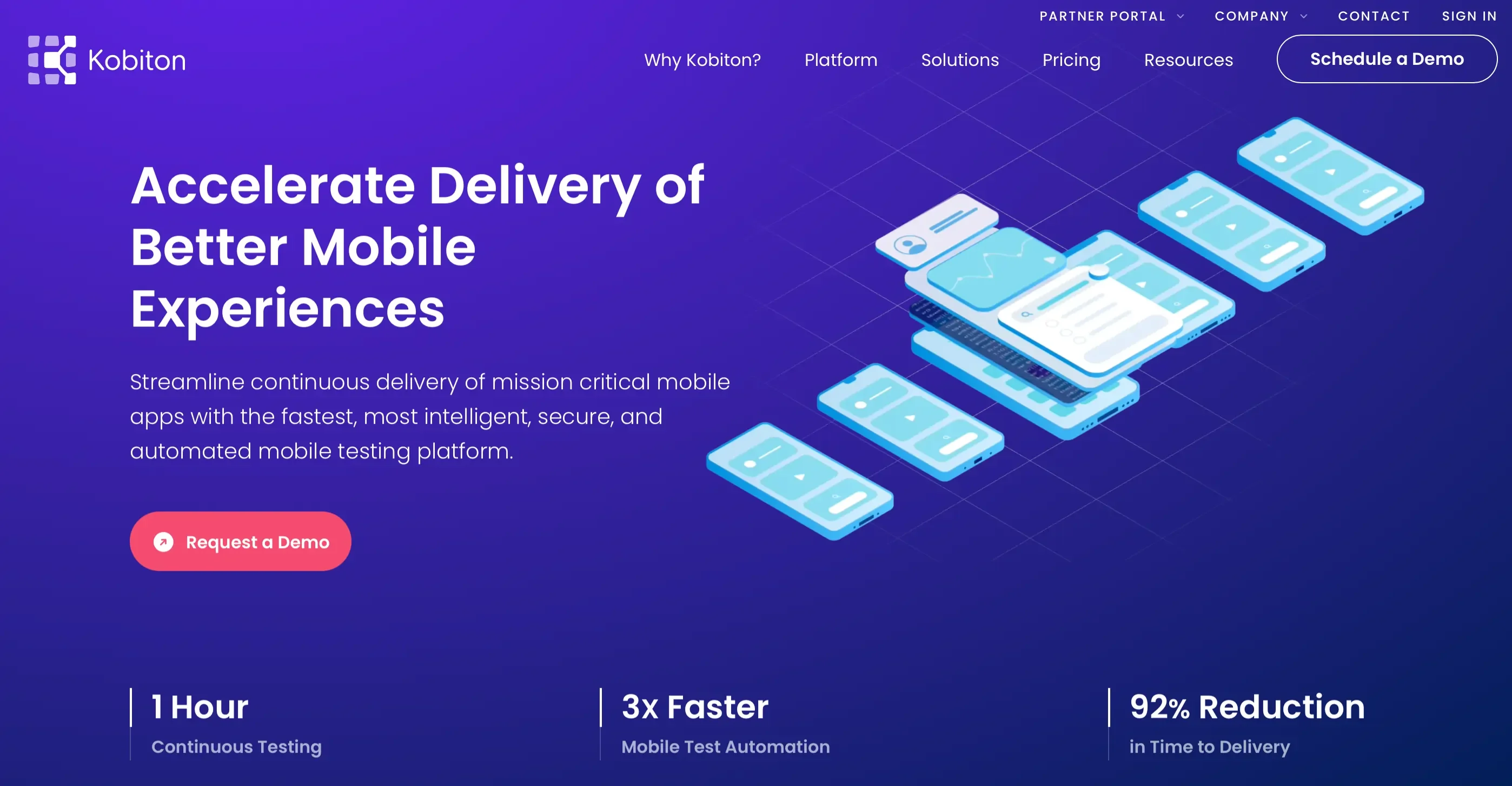
AI Features
AI-driven UI comparison: The platform uses AI to perform pixel-level analysis of mobile app interfaces. This helps catch subtle visual changes between versions, making it ideal for maintaining UI consistency across devices and operating systems.
Failure insights: AI filters out unnecessary noise from CI pipelines and highlights the failures that matter most. It clusters related issues, prioritizes critical bugs, and offers deeper insights to speed up debugging and resolution.
Strengths
Robust hybrid device lab infrastructure: With a mix of physical and virtual devices, the platform supports high-scale mobile testing across Android and iOS. This hybrid setup ensures accurate results under real-world conditions.
Fast SLA response for enterprise clients: Enterprise users benefit from fast and reliable support. Dedicated SLAs ensure that any technical or service-related issues are handled promptly crucial for time-sensitive release cycles.
Limitations
iOS testing limited to cloud devices only: All iOS tests are run on cloud-based devices, with no support for macOS simulators. This may not suit teams needing more control or offline testing capabilities.
Not built for prompt-based workflows: The platform lacks advanced support for modern prompt-driven testing methods using generative AI, making it less ideal for teams looking to automate through LLMs or conversational interfaces.
3. Waldo
Waldo, now acquired by Tricentis, continues to operate as a standalone SaaS platform focused on no-code mobile test automation. It enables teams to record user flows directly within a browser-hosted mobile emulator and replay them across various devices, OS versions, and screen sizes. This allows for efficient test coverage without needing access to physical devices or writing test scripts.
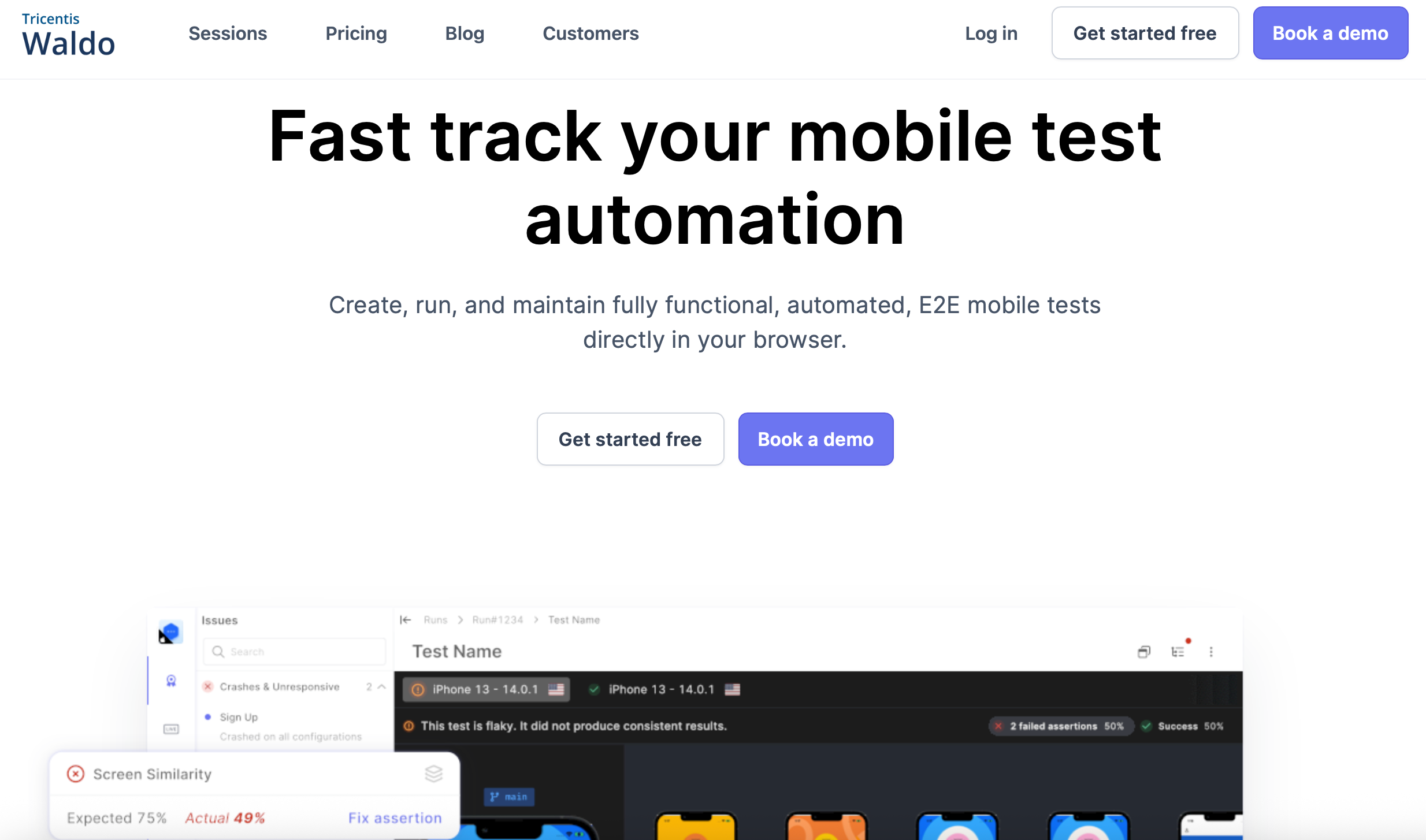
Unique Edge
Waldo’s standout feature is its SDK-free approach; teams simply upload their .APK or .IPA files, and Waldo handles the rest. There's no need to integrate any testing SDKs into the app. Another key advantage is Root-Cause Rewind, which enhances test replays by overlaying network headers, logs, and performance data directly onto the point of failure. This makes it easy to understand what went wrong and why, reducing debugging time significantly.
Strengths
Massive concurrency support with a pool of over 3,000 emulated devices allows teams to scale tests quickly and run parallel executions without bottlenecks.
Developer-friendly CLI triggers enable seamless integration into any CI/CD pipeline with minimal setup. A single command can trigger complex test runs, making automation workflows smoother and faster.
Clean and modern UI with collaboration features suited for cross-functional teams, including product and design.
Limitations
Since Waldo relies on emulators rather than real devices, certain real-world factors like thermal throttling, hardware-specific bugs, or battery drain issues might not be captured effectively.
It may not be ideal for apps that require hardware-level testing (e.g., camera, sensors, biometric authentication), limiting its use in hardware-sensitive scenarios.
4. Repeato
Repeato is a lightweight desktop tool built exclusively for mobile app testing. It’s designed to simplify test creation through a completely no-code approach, using computer vision and screen matching. Unlike most cloud-first platforms, Repeato is focused on local, physical device testing making it especially appealing to teams with security or compliance concerns.
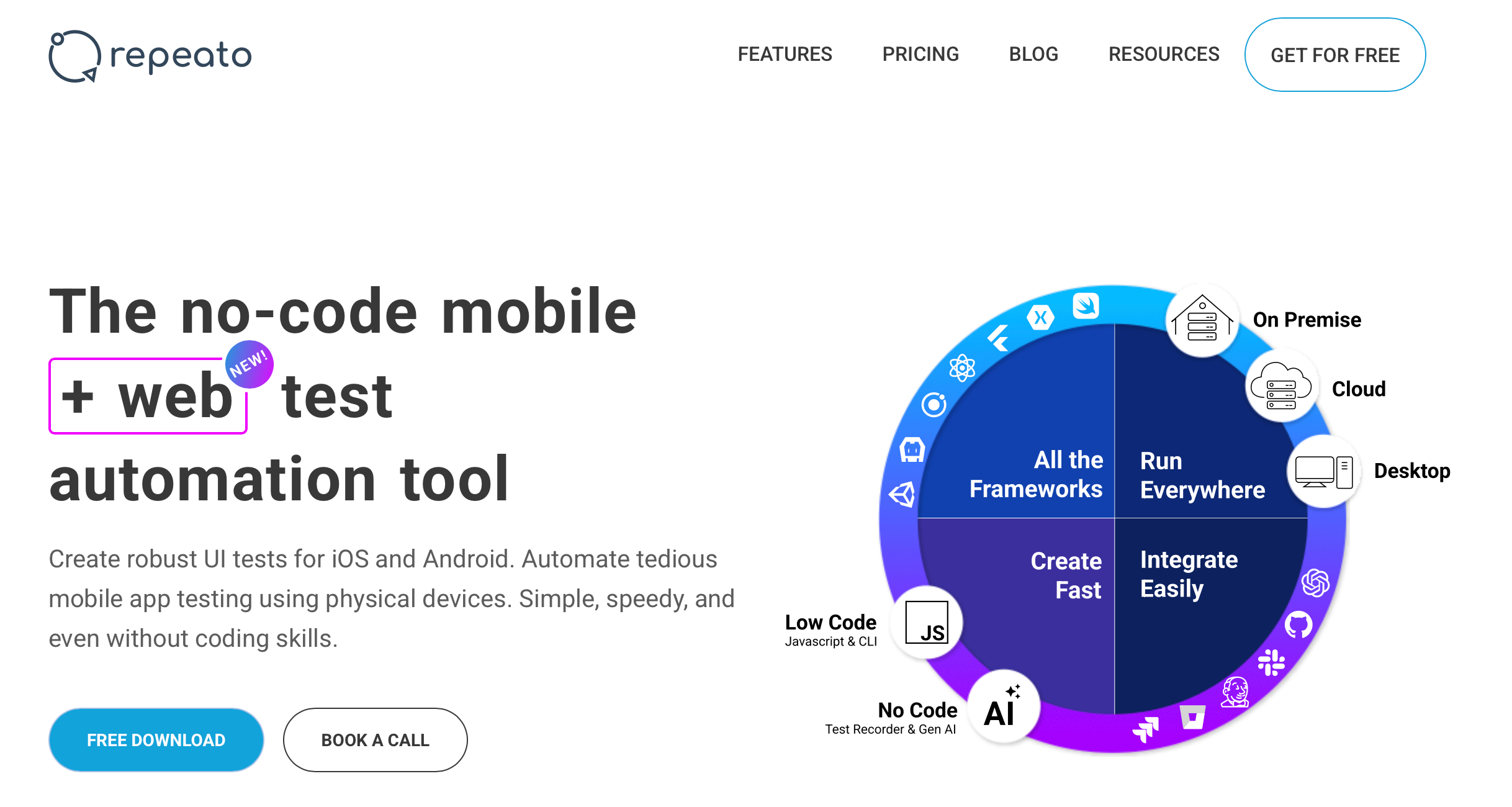
Key Features
Drag-and-drop test editor: Create and manage test flows without writing code or dealing with XPath, element locators, or scripting. This makes the tool accessible to non-technical team members.
Computer vision-powered testing: Tests rely on visual element matching rather than code-based identifiers. This allows them to remain stable even when UI layouts or themes change between app versions.
Strengths
USB-only, local testing: Ideal for security-sensitive environments, Repeato runs tests directly on devices connected via USB with no cloud storage or external access required.
Extremely low learning curve: Most users can start building and running tests in under 10 minutes, making it one of the fastest tools to onboard and adopt for mobile QA.
Cross-platform support: Works with both Android and iOS, and supports native, hybrid, and Flutter apps.
Limitations
No hosted device cloud
Limited collaboration or CI capabilities
5. Mobot
Mobot takes a unique approach to mobile app testing by introducing robotic automation. Rather than relying on virtual devices or emulators, Mobot uses physical robots to interact with real smartphones and tablets. These robots simulate human gestures like taps, swipes, shakes, and hardware button presses, enabling highly accurate and realistic end-to-end testing.
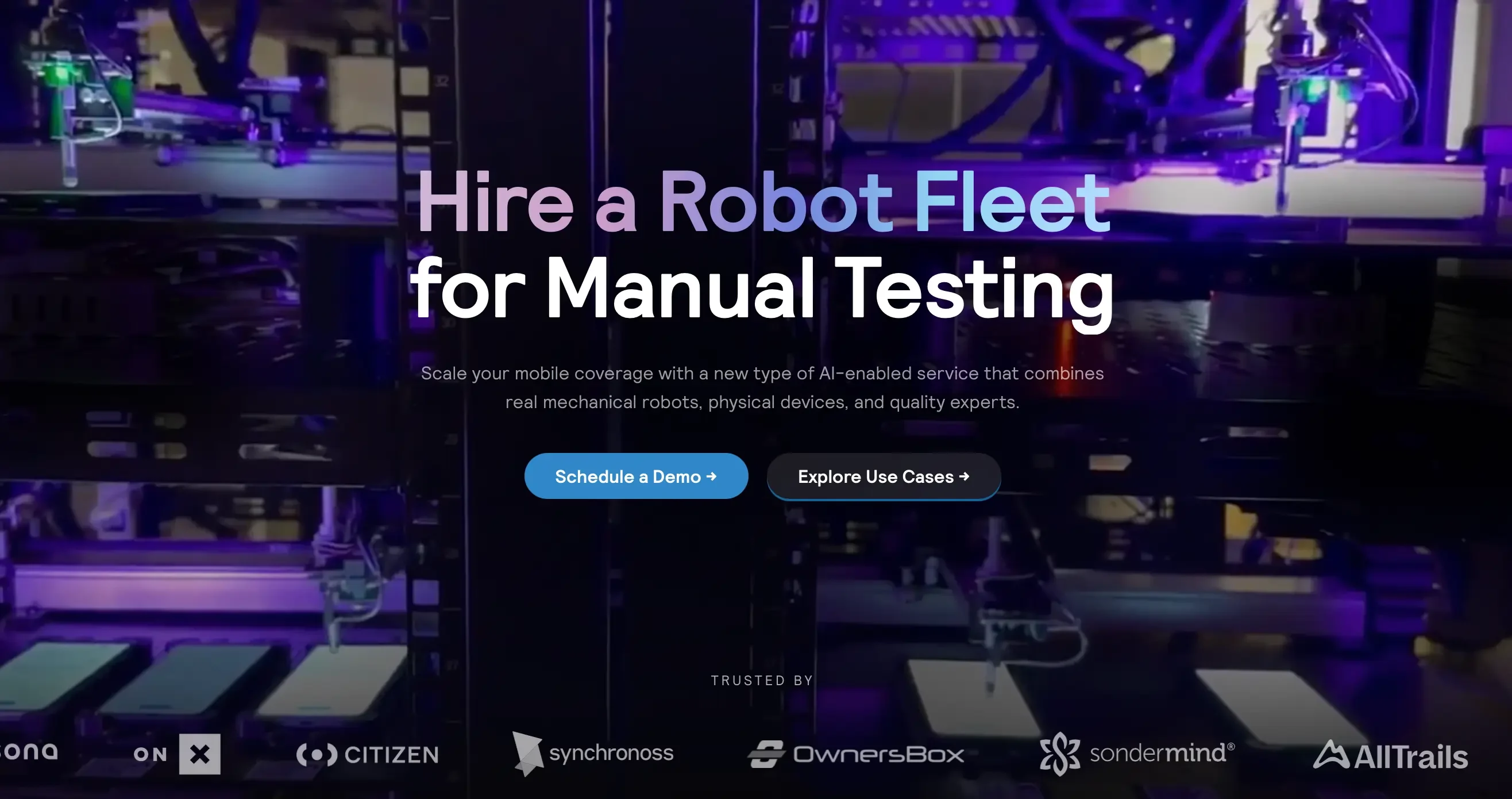
Why Robots?
Mobot is particularly valuable for testing hardware-dependent features that are difficult or impossible to test with software-based tools. This includes interactions like accelerometer responses, face unlock, camera usage, fingerprint recognition, and more. The system also captures high-quality 4K video recordings of each test, complete with pass or fail annotations, giving QA teams full visibility into every interaction.
Strengths
Significant time savings: Mobot has helped enterprise clients reduce overnight regression testing cycles from 25 hours to just 3 hours, improving release speed and operational efficiency.
High-fidelity bug reporting: A human-in-the-loop quality assurance process ensures that only relevant, high-priority bugs are reported, minimizing noise and improving signal accuracy in test reports.
Full-stack validation: Tests real devices under real conditions, which is ideal for ensuring app performance in actual usage scenarios.
Limitations
High cost of adoption: The pricing starts at over $60,000 per year, which may be out of reach for smaller teams or startups.
Limited test flexibility: Test execution is tied to the availability of Mobot's physical testing racks, meaning scheduling delays can occur depending on demand.
6. Apptim
Apptim is a specialized testing tool built to help mobile teams measure and analyze app performance on real devices. Rather than focusing on functional automation, Apptim centers on key performance indicators such as rendering speed, CPU and GPU usage, memory consumption, battery drain, and network activity. It is designed to give developers and testers clear visibility into how their apps behave under real-world conditions.
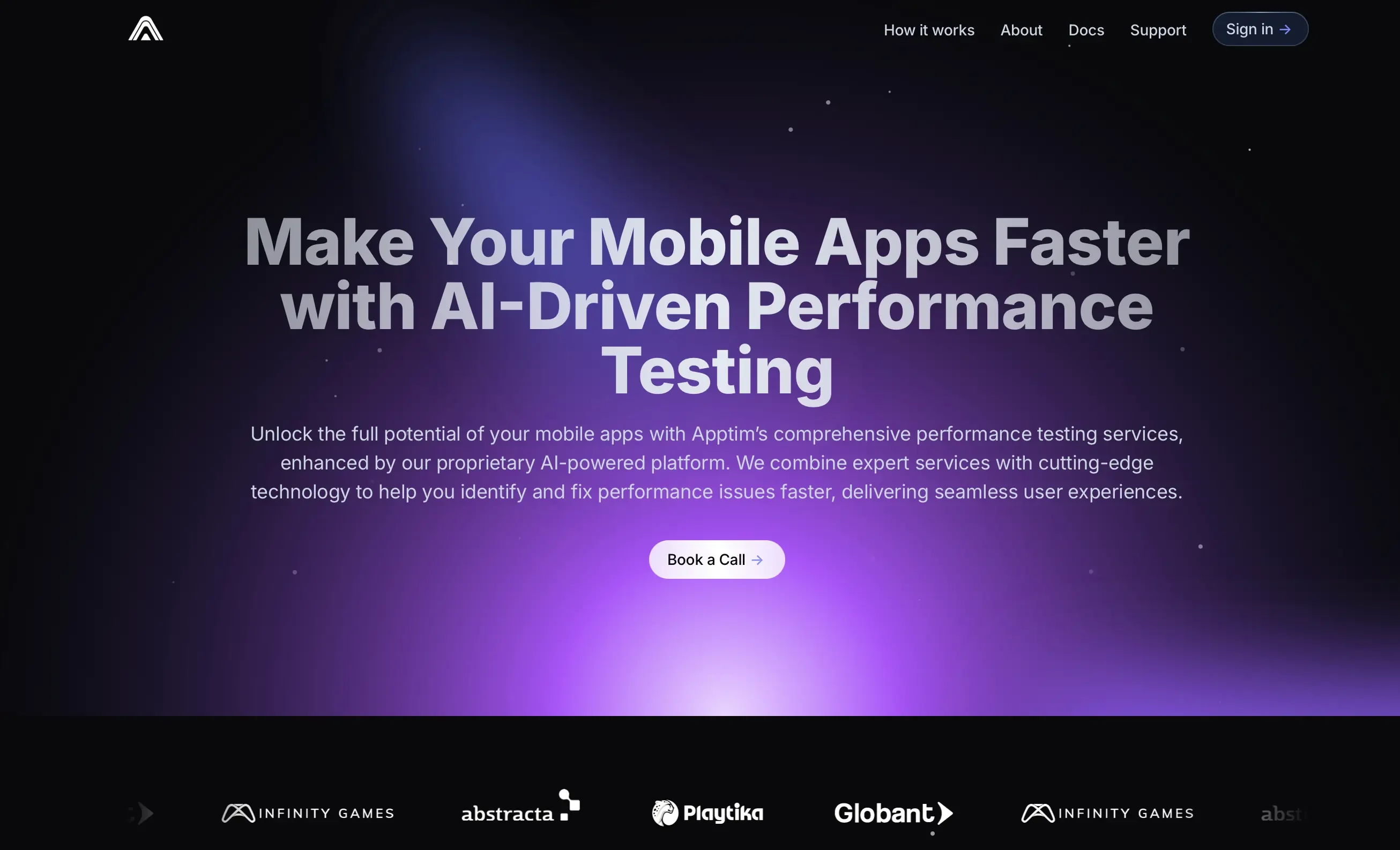
Standout Features
Performance regression detection: Apptim compares performance metrics between different builds, making it easy to spot regressions in speed, resource usage, or responsiveness.
One-click integration with JIRA: Teams can export test reports directly to JIRA with a single click, streamlining the bug reporting and tracking workflow.
Strengths
Fully offline operation: Apptim supports offline usage, which is ideal for security-sensitive environments such as air-gapped labs where internet access is restricted.
Free tier available: Independent developers and small teams can get started with Apptim at no cost, making it accessible for low-budget testing scenarios.
Detailed visual reports: Performance test results are presented in clean, easy-to-read dashboards, helping teams quickly interpret metrics and take action.
Limitations
No built-in functional testing: Apptim does not support functional automation out of the box. Teams must integrate it with tools like Appium separately to handle end-to-end functional tests.
Limited automation features: While excellent for performance testing, Apptim is not suited for managing test scripts or running large-scale automated test suites.
7. SOFY.ai
SOFY.ai is a modern AI-powered mobile testing platform that aims to eliminate traditional test scripting entirely. Leveraging GPT-4 Vision, SOFY allows testers to write natural language prompts describing the desired scenario. The platform then automatically generates, executes, and heals the test based on the prompt. This no-code, prompt-driven approach enables faster test creation and reduces maintenance efforts across evolving app versions.
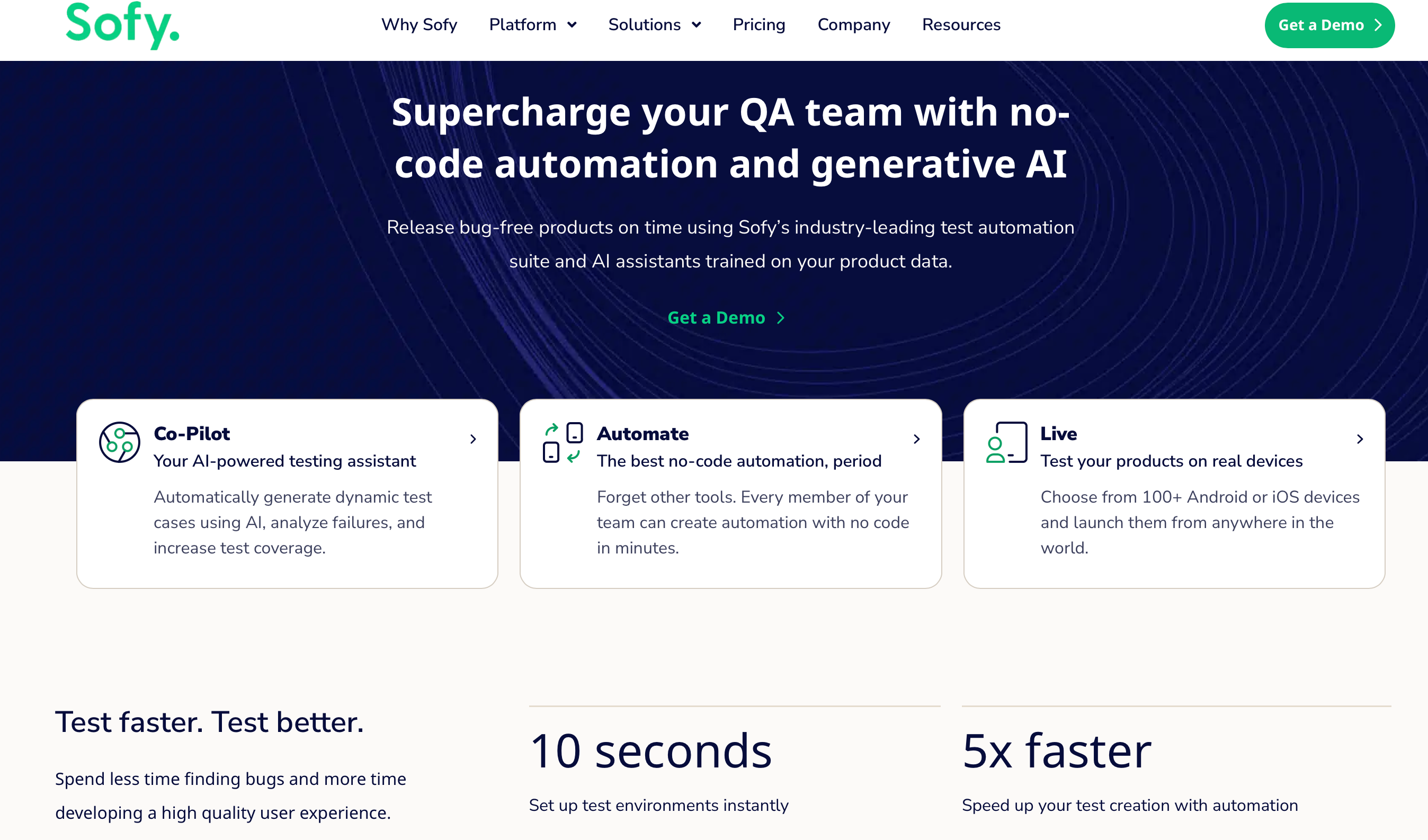
AI Capabilities
Accessibility and UX heuristic testing: SOFY uses AI to identify common accessibility issues and poor UX patterns by analyzing screens and user flows, helping teams build more inclusive and user-friendly apps.
DOM-aware self-healing engine: When UI elements change between builds, SOFY intelligently updates broken selectors. In Q2 2025, it achieved an 82 percent automated fix rate, significantly lowering the time required for test maintenance.
Strengths
Browser-based testing at scale: SOFY provides access to over 100 real mobile devices through the cloud, allowing teams to test across multiple screen sizes, OS versions, and manufacturers without needing local infrastructure.
Visual debugging with heat maps: Test replays include interactive heat-map overlays that highlight high-error zones and areas of frequent user interaction, making it easier to pinpoint bottlenecks and bugs.
Prompt-to-test simplicity: By removing the need for scripting, SOFY allows non-technical stakeholders such as product managers and designers to participate in test creation and validation.
Limitations
Progressive Web App (PWA) inclusion may be polarizing: While SOFY supports testing for PWAs along with native apps, some QA professionals focused strictly on mobile-native performance might see this broader scope as a distraction.
Still maturing for edge-case logic: Although the AI handles general test flows well, highly customized logic or deeply nested conditions may still require manual intervention or test tuning.
8. Maestro
Maestro is a modern, open-source mobile UI testing framework built as a lightweight and developer-friendly alternative to Appium. Created by the team at mobile.dev, it focuses on ease of use, speed, and flake resistance. Tests are written in simple YAML syntax, allowing developers and QA engineers to define test flows quickly without heavy setup or scripting knowledge.
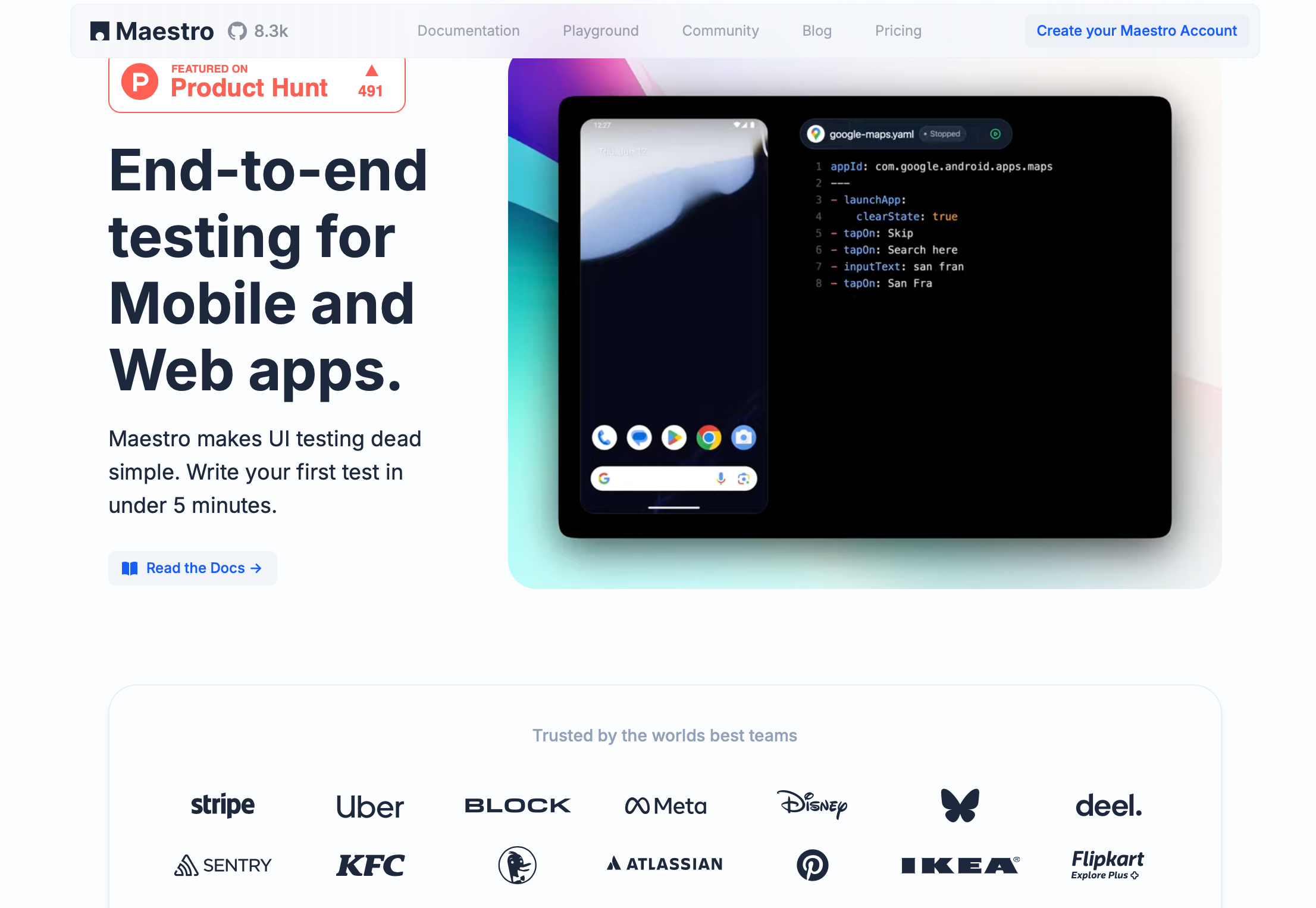
Key Differentiators
Text-based selectors with auto-waiting: Maestro intelligently waits for UI elements to appear, eliminating the need for hard-coded sleep commands and reducing test flakiness.
Maestro Cloud: Offers cloud-based test execution with features like visual diff snapshots between builds and parallel test runs across devices, helping teams scale with minimal infrastructure.
Strengths
Minimal setup and fast execution: The CLI binary is only 2 MB, making it easy to install and integrate into CI pipelines without bloating the environment.
Strong community support: With over 7,000 testers active in its Slack community, Maestro benefits from a rapidly growing ecosystem, frequent updates, and accessible help for newcomers.
Developer-centric approach: The tool is built with speed and simplicity in mind, making it ideal for engineering-driven QA teams.
Limitations
No official IDE: Maestro currently lacks a dedicated integrated development environment, which may slow down onboarding for testers used to more visual interfaces.
AI locator engine is still maturing: While Maestro is experimenting with AI-based element detection, the feature is in early beta and may not yet be reliable for production-level testing.
9. Autify Mobile
Autify Mobile is a dedicated product offering from Autify that focuses exclusively on native mobile app testing. Unlike its web testing counterpart, Autify Mobile is built from the ground up for mobile environments and leverages AI to enable fast, stable, and scalable test automation. Tests are executed on real devices in the cloud with no local infrastructure required, making it an appealing solution for teams looking for a fully managed experience.
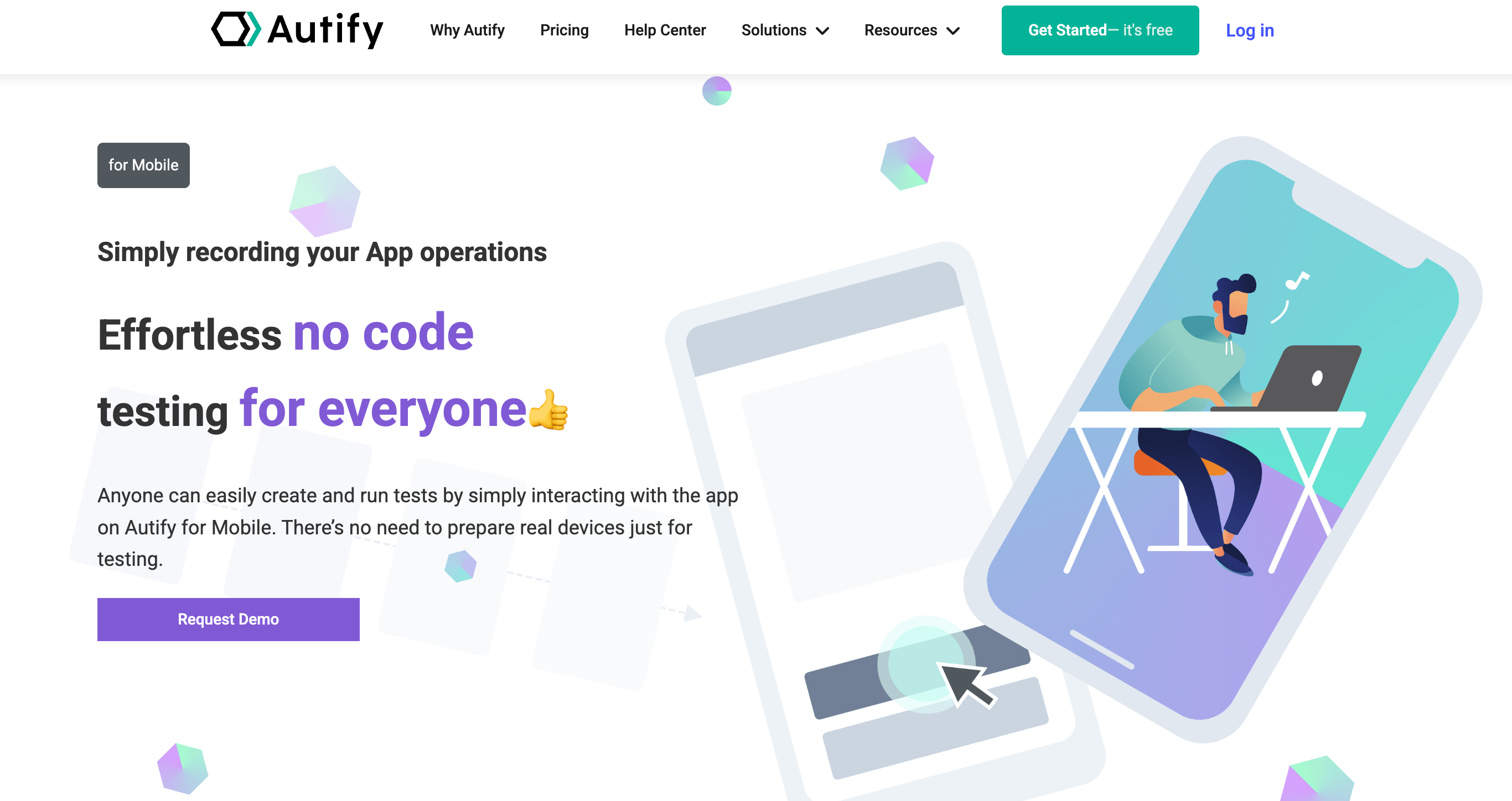
AI Capabilities
Intelligent Screen Recognition: This AI-powered system maps and understands app screens with remarkable precision, achieving 99.81 percent match accuracy during test runs. It helps ensure reliable navigation and interaction, even if the UI undergoes minor visual changes.
Visual regression diffing: Autify automatically compares screen states across builds and highlights visual differences at a per-test level, helping teams detect unintended UI changes quickly.
Strengths
Fully managed cloud environment: No setup or maintenance is needed. Teams can begin testing on real mobile devices immediately, without dealing with device procurement, configuration, or hosting.
CI/CD and communication tool integrations: Autify supports direct integration with GitHub, CircleCI, and other pipelines, and can send real-time alerts to Slack to keep teams informed of test results and failures.
User-friendly interface: The platform is designed with accessibility in mind, enabling both QA and non-technical stakeholders to participate in creating and managing test scenarios.
Limitations
No local device support: All testing must be performed on cloud-hosted devices. This may not suit teams with strict data policies or those requiring hands-on testing with in-house hardware.
Smaller device pool: Autify Mobile supports around 250 devices, which is less than some competitors like Kobiton that offer access to over 550 devices, potentially limiting test coverage for certain teams.
10. QualGent
QualGent is a cutting-edge mobile testing startup backed by Y Combinator’s Summer 2024 batch. The platform represents a shift toward autonomous testing by using large language model (LLM) agents instead of traditional scripts. These AI agents are capable of crawling mobile app builds, understanding user flows, planning test scenarios, executing them, and even self-healing when test cases break over time. The goal is to automate not just test execution, but also test design and maintenance.
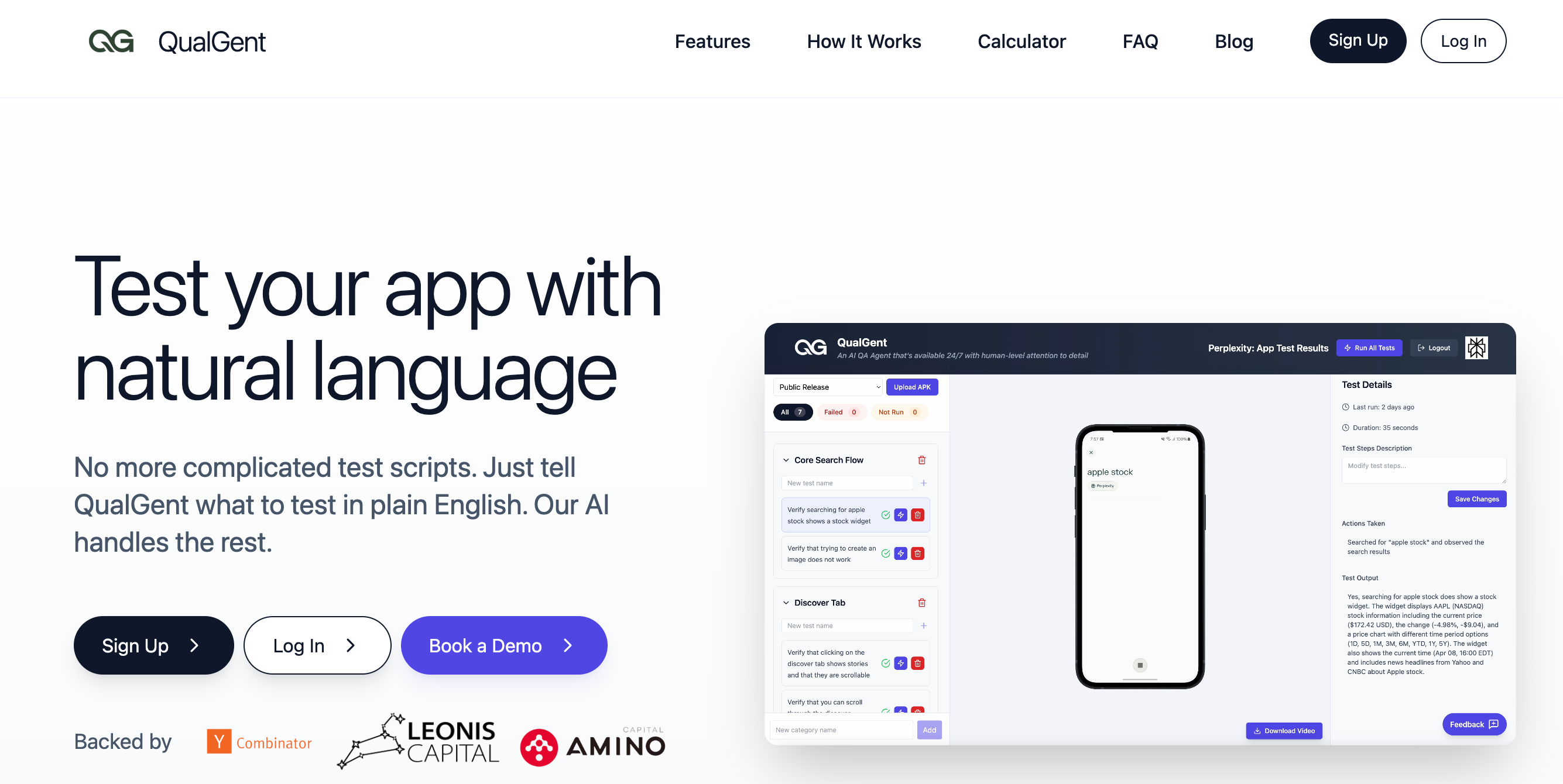
Distinctive AI Features
Goal-oriented AI agents: Instead of relying on predefined test steps, QualGent allows users to set high-level objectives. The agents interpret these goals, explore the app, and generate meaningful test coverage dynamically.
Significant flake reduction: Compared to traditional frameworks like Appium, QualGent reports a four-times reduction in flaky tests, thanks to its adaptive AI and self-healing mechanisms.
Strengths
Automated bug reporting with AI: The platform generates detailed, reproducible bug tickets using GPT. These include step-by-step instructions, screen captures, and environment data, making it easier for developers to identify and fix issues.
Forward-looking product roadmap: Future updates will include AI agents dedicated to performance and security testing, broadening the platform's scope beyond functional testing.
Scriptless experience for QA teams: By removing the need for coding or detailed test scripting, QualGent enables QA teams to scale test coverage with minimal manual input.
Limitations
Early-stage product: As of mid-2025, QualGent is still in beta. Pricing, SLAs, and enterprise support policies are still evolving, which may be a concern for risk-averse teams.
Limited adoption in large enterprises: While promising, the tool has yet to see widespread use in enterprise environments, and some teams may prefer to wait for broader validation before adopting it at scale.
Final Thoughts
In 2025, mobile testing has evolved far beyond scripting and manual validation. The top companies on this list are not just building test tools, they're shaping the future of how mobile apps are developed, debugged, and delivered. Whether it's robotic automation, vision-based analysis, or prompt-driven test generation, each platform here brings something unique to the QA process.
Choosing the right mobile testing partner is no longer about checking boxes for “automated” or “manual.” It's about identifying tools that align with your velocity, product complexity, and compliance needs. Platforms like Quash offer an integrated, AI-native experience purpose-built for mobile teams especially those juggling weekly releases, design-driven development, and real-time telemetry.
As mobile ecosystems grow more complex, QA teams must evolve beyond traditional testing practices. The companies featured in this list offer powerful, AI-enhanced capabilities to help you do just that while saving time, reducing bugs, and keeping users happy.

